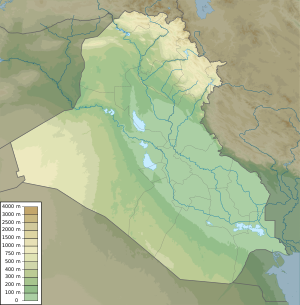Kirkuk Citadel
| Kirkuk Citadel | |
|---|---|
| Kirkuk, Iraq | |
 View of the Kirkuk citadel from outside | |
 Kirkuk Citadel Location in Iraq | |
| Coordinates | 35°28′11″N 44°23′45″E / 35.46972°N 44.39583°ECoordinates: 35°28′11″N 44°23′45″E / 35.46972°N 44.39583°E |
| Type | Citadel |
| Site information | |
| Controlled by | Iraq |
| Open to the public | Yes |
| Condition | Partially ruined |
| Site history | |
| Built by | Neo-Assyrian Empire (first time) Ottoman Empire (current walls) |
The Kirkuk Citadel (Arabic: قلعة كركوك,[1] Kurdish: قەڵای کەرکووک,[2] Turkish: Kerkük Kalesi[3]) is in the centre of Kirkuk, Iraq, and is considered to be the oldest part of the city. The citadel stands on an artificial mound 130 feet high located on a plateau across the Khasa River.
History[]

King Seleucus I Nicator[4] built a strong rampart with 72 towers around the 72 streets and the two entries to the citadel. A jewel of the citadel is the so-called "Red Church", with traces of mosaics dating to the period before the Islamic conquest of Iraq in the 7th century. It is believed that Timur visited the citadel in 1393 during his military expedition. The modern walls go back to the Ottoman period.
In the 1990s, Saddam Hussein, announced a campaign to beautify the walled citadel. A large number of historical and religious sites still exist there, including a monument believed to be the Tomb of Daniel.[5]
References[]
- ^ Mahmoud. "قلعة كركوك" (PDF). CGUAA (in Arabic).
- ^ "قەڵای کەرکووک" (in Kurdish). Retrieved 1 December 2020.
- ^ "Kerkük". TDV Islâm Ansiklopedia (in Turkish). Retrieved 1 December 2020.
- ^ Clifford Edmund Bosworth (1954). The Encyclopaedia of Islam. p. 144. ISBN 9004060561.
- ^ "كركوك في العصور القديمة", ئاراس (in Arabic)
- Castles in Iraq
- Buildings and structures in Kirkuk
- Iraqi mosque stubs



